Top Causes Of Late-Season AC Performance Issues

As the summer season nears its end, soaring heat can place immense strain on air conditioning systems right when they’re needed most. McAllister Energy, your trusted HVAC specialist in Southern New Jersey, is here to help homeowners identify and fix late-season cooling problems before they disrupt comfort or increase energy usage.
This article addresses a common concern among homeowners: Why is my AC not keeping up as summer draws to a close? We’ll examine the most frequent causes of declining performance, including clogged components, thermostat issues, refrigerant shortages, and overall system wear. You’ll also learn when it’s time to call in a professional to restore reliable cooling.
Bring Back Peak Cooling Efficiency: Rely on McAllister Energy for skilled air conditioner diagnostics and service. Call now to get started!
Tackling End-of-Season AC Struggles: Why Is My AC Not Keeping Up?
Contents
- 1 Tackling End-of-Season AC Struggles: Why Is My AC Not Keeping Up?
- 1.1 Dirty HVAC Filters and Restricted Air Circulation
- 1.2 Refrigerant Loss and Declining Cooling Efficiency
- 1.3 Dust-Covered Evaporator and Coils
- 1.4 Outdated or Undersized Cooling Systems
- 1.5 Incorrect Thermostat Use and Calibration Problems
- 1.6 Air Loss from Leaky Ducts and Insufficient Insulation
- 1.7 Worn Air Conditioner Blower Motor or Failing Capacitor
- 2 When to Contact McAllister Energy for Expert HVAC Support
- 3 Why Is My AC Not Keeping Up: FAQs
- 3.1 How Do High Outdoor Temperatures Impact My AC’s Performance Late in the Season?
- 3.2 Will a Variable-Speed HVAC System Help With Late-Season Cooling?
- 3.3 Can High Indoor Humidity Make My Cooling System Seem Less Effective?
- 3.4 How Does Restricted Airflow in Ductwork Affect Cooling Efficiency?
- 3.5 Do Smart Thermostat Features Help Improve Late-Summer AC Performance?
- 4 Conclusion
- 5 Contact McAllister Energy for Trusted HVAC Services

When late-summer heat reaches its highest point, air conditioners often begin to lag in performance. Identifying the underlying causes of this decline allows homeowners to respond quickly and prevent discomfort during the season’s final stretch.
Stay Ahead of Late-Summer Heat: Turn to McAllister Energy for thorough HVAC inspections and seasonal tune-ups. Contact us today!
Dirty HVAC Filters and Restricted Air Circulation
One of the leading culprits behind late-season AC problems is a clogged air filter. As dust, allergens, and debris accumulate, airflow through the system becomes limited. This restriction diminishes cooling performance and forces the unit to work harder, increasing overall wear on your equipment.
When airflow is restricted, your AC system works harder to maintain comfort, causing indoor temperatures to climb and utility costs to rise. Prolonged neglect of dirty filters can eventually result in severe system damage and expensive repairs.
Reduced airflow from vents or uneven cooling in different rooms indicates that the air filter requires immediate attention.
At the height of the cooling season, pleated filters should be replaced at least every 30 days to support optimal airflow and system efficiency. Staying on schedule with filter changes helps preserve your AC’s performance and keeps your home consistently comfortable through the hottest part of summer.
Refrigerant Loss and Declining Cooling Efficiency
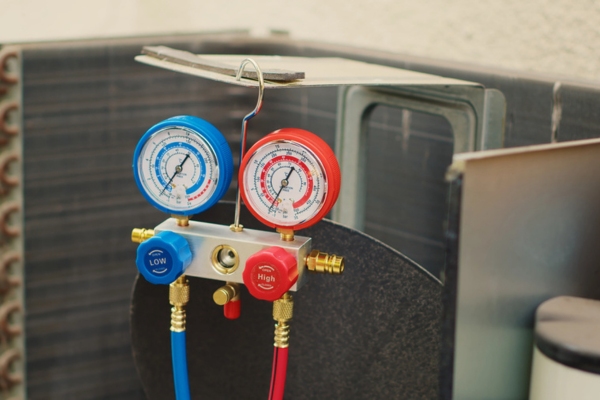
Continuous thermal expansion and contraction over the summer months can wear down connections, eventually causing the refrigerant to leak as the season winds down. This often leads to longer cooling cycles, reduced cooling power, and ice buildup on the evaporator coil. These are common signs of low refrigerant and an unbalanced system. Another warning signal is warm air from your vents, which may indicate a low refrigerant charge.
Since working with refrigerant demands certified training and specialized equipment, only licensed HVAC technicians should handle AC recharge services. A qualified professional can detect signs of a leak, repair the damaged components, and restore the refrigerant to the correct level to ensure efficient system performance.
Eliminate Hot and Cold Spots: Choose McAllister Energy to fine-tune your airflow and seal ductwork for consistent comfort. Contact us now!
Dust-Covered Evaporator and Coils
During the cooling season, evaporator and condenser coils often gather pollen, grass debris, and airborne contaminants. This accumulation creates an insulating barrier that blocks efficient heat transfer, making it harder for the system to remove heat from your home. Dirty coils can lead to longer run times and weaker cooling performance, especially near the end of summer.
To keep your system operating efficiently, have the coils professionally cleaned at least once a year. In between service visits, homeowners can gently brush or vacuum coils that are easy to access. These cleaning steps play a key role in proper condenser care and help prevent performance issues.
Outdated or Undersized Cooling Systems
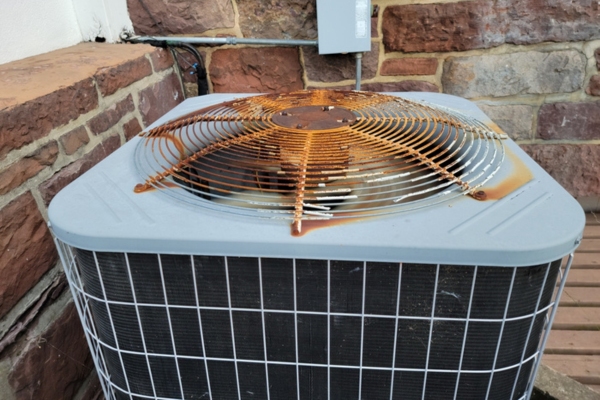
If your air conditioner is too small for your home, especially after additions, remodels, or insulation improvements, it may no longer meet demand. The system will run for extended periods and still fall short of cooling the space properly, leading to typical late-season performance issues. Similarly, older units lose efficiency over time, making it harder to maintain comfort as indoor temperatures rise.
Be alert to these common indicators of an aging or undersized AC unit:
- Short or frequent cycling
- Unexplained increases in energy costs
- Uneven temperatures or poor cooling performance
If you’re noticing these issues, it may be time to consider replacing an older AC system. An HVAC professional can perform a detailed load calculation to assess the correct unit size for your home. Upgrading to a model with a higher SEER rating enhances cooling performance, boosts energy efficiency, and provides more consistent comfort during the season’s hottest days.
Upgrade to Smarter Cooling: Let McAllister Energy install and program your smart thermostat for better efficiency and control. Call today!
Incorrect Thermostat Use and Calibration Problems
Improper thermostat settings are a common source of late-season cooling issues. Selecting the “On” fan mode rather than “Auto” keeps air moving constantly, which can cause moisture to re-evaporate inside the home. This reduces dehumidification and makes indoor conditions feel less comfortable during humid end-of-summer days.
Over time, thermostat sensors can become less accurate, resulting in calibration issues. This may cause the system to short-cycle or operate inefficiently, leading to wasted energy and unnecessary strain on system components.
To correct these issues, switch the fan setting back to “Auto,” consider replacing older thermostats, or upgrade to a programmable model for enhanced control. Maintaining proper settings and recalibrating when needed can greatly improve energy efficiency and overall comfort indoors.
Air Loss from Leaky Ducts and Insufficient Insulation
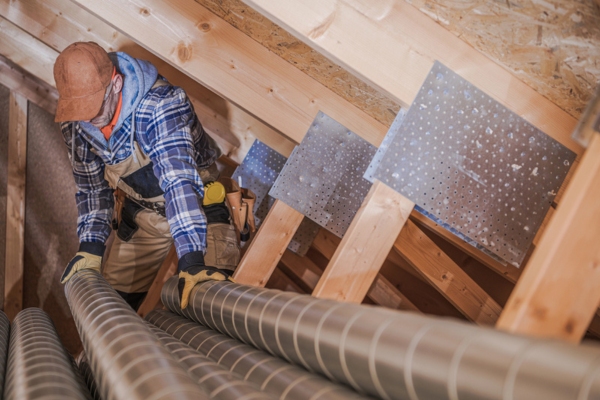
Extreme summer heat can cause ductwork to expand, potentially creating small openings that allow cooled air to escape, particularly in unconditioned spaces such as attics or crawl spaces. This air loss lowers system efficiency and often results in uneven cooling or uncomfortably warm rooms.
Common signs of duct issues include warm or cool spots near vents and louder-than-usual airflow. To resolve these problems, have a professional inspect the ductwork and seal any leaks found during the assessment.
Applying mastic or foil tape to exposed seams as a temporary measure can help minimize air loss. Adding or upgrading insulation around ducts will also support more consistent cooling and improve overall system performance.
Boost Cooling Efficiency: Explore variable-speed AC options with McAllister Energy for quieter operation and lower energy costs. Call today!
Worn Air Conditioner Blower Motor or Failing Capacitor
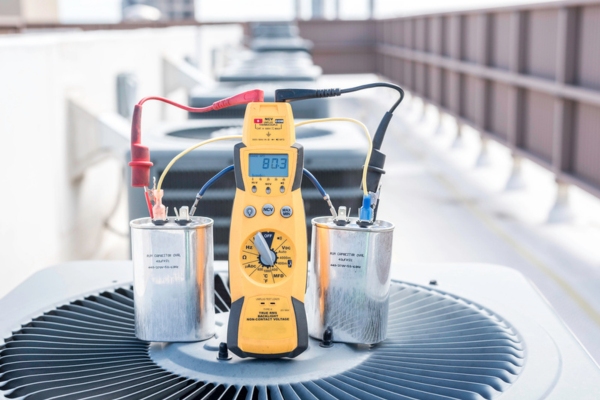
Extended use over the summer can take a toll on essential parts such as the blower motor and start capacitor. When these components wear out, airflow is reduced, making it harder for the system to push cool air evenly through the home. These failures frequently cause late-season AC problems and typically require prompt service to avoid a total system breakdown.
Watch for these signs that may indicate blower motor or capacitor problems:
- Unusual humming or buzzing sounds
- Blower running slowly or inconsistently
- Lack of airflow, even when the fan is switched on
When these issues appear, schedule professional HVAC electrical service. A trained technician can evaluate the blower motor, replace a failing capacitor, or suggest upgrading to a high-efficiency blower assembly to improve airflow and restore proper cooling function.
Improve Moisture Control: Discover how McAllister Energy can help manage humidity levels for a more comfortable home. Contact us now!
When to Contact McAllister Energy for Expert HVAC Support
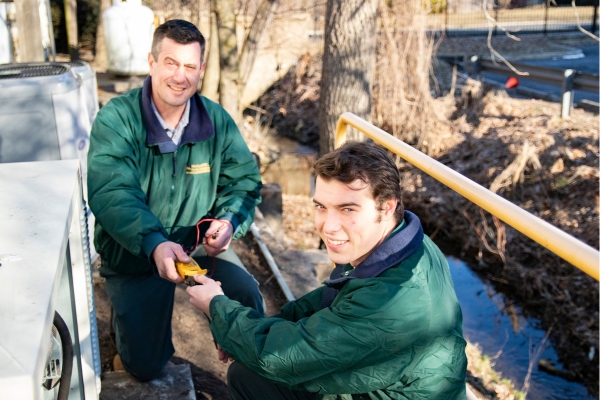
If your air conditioner still underperforms after basic checks, it’s time to call in the professionals at McAllister Energy. Our comprehensive diagnostic process uses advanced tools such as refrigerant gauges, thermal cameras, and airflow meters to uncover the root of the problem precisely.
McAllister Energy provides end-of-season tune-up services designed to boost performance, enhance efficiency, and prepare your system for the final weeks of summer and beyond. If repairs are no longer practical or economical, our experts can assist you with an AC replacement appointment and help you choose a high-efficiency unit tailored to your home and budget.
Your Local Cooling Specialists: Turn to McAllister Energy for quick and reliable AC repair you can count on. Schedule your service today!
Why Is My AC Not Keeping Up: FAQs
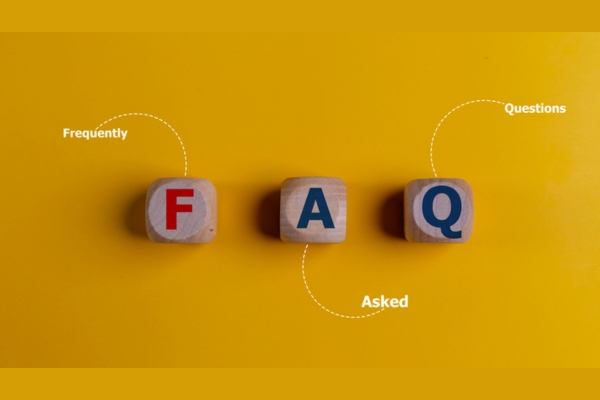
How Do High Outdoor Temperatures Impact My AC’s Performance Late in the Season?
Prolonged high temperatures make it harder for the outdoor condenser to release heat, raising refrigerant pressure and limiting the system’s cooling ability. This forces your AC to operate longer, increasing energy use and putting extra strain on key components. Routine professional maintenance, such as coil cleaning and refrigerant checks, helps your system stay efficient during extreme late-summer heat.
Will a Variable-Speed HVAC System Help With Late-Season Cooling?
Yes. Variable-speed compressors adjust their output based on your home’s cooling needs, operating at lower speeds over extended periods. This leads to more stable indoor temperatures, better moisture control, and improved energy efficiency. To ensure proper sizing and installation, work with a trusted air conditioning specialist who can recommend the best variable-speed system for your home.
Can High Indoor Humidity Make My Cooling System Seem Less Effective?
Yes. When indoor humidity is high, your air conditioner must first reduce moisture levels before lowering the temperature, often making the space feel damp or uncomfortable, even if the thermostat reading is correct. To improve comfort, set the fan mode to “Auto,” consider installing a whole-home dehumidifier, or schedule an HVAC evaluation to enhance your system’s moisture control.
Finish the Season with Confidence: Schedule late-summer maintenance with McAllister Energy to keep your AC performing at its best. Contact us now!
How Does Restricted Airflow in Ductwork Affect Cooling Efficiency?
Leaks or insufficient insulation in ductwork can create pressure imbalances, reducing airflow to your vents. As a result, your AC must work harder to maintain desired temperatures, raising energy costs and putting extra stress on the blower motor. Professional duct sealing and airflow balancing correct these issues, restoring proper pressure and helping your system operate efficiently.
Do Smart Thermostat Features Help Improve Late-Summer AC Performance?
Yes. Smart thermostats adapt to your comfort preferences, adjust temperatures based on occupancy or outdoor conditions, and allow remote system access. These capabilities help minimize excess runtime and ease system workload during extreme heat. For proper installation and calibration, work with an HVAC provider experienced in smart thermostat integration and full-system solutions.
Conclusion
Late-summer cooling issues often stem from airflow problems, low refrigerant levels, dirty coils, thermostat inaccuracies, or outdated equipment. These concerns typically develop after a full season of use but can be addressed with the right solutions. Scheduling seasonal maintenance and prompt repairs is key to restoring your AC’s efficiency and keeping your home comfortable through the end of summer.
Beat the late-season heat and call McAllister Energy for thorough HVAC diagnostics, reliable solutions, and high-efficiency upgrades in Southern New Jersey. Enjoy lasting comfort all season long.
Elevate Your Home Comfort: Turn to McAllister Energy for high-efficiency HVAC upgrades that deliver better cooling and lower energy costs. Call us today!
Contact McAllister Energy for Trusted HVAC Services
McAllister Energy proudly delivers expert heating and cooling services throughout Southern New Jersey. Our team comprises certified HVAC professionals with extensive experience in system tune-ups, repairs, installations, and replacements. Every technician is trained to handle your home’s comfort needs accurately and carefully.
We are dedicated to offering competitive pricing for HVAC services across the region. Our maintenance solutions are designed to maximize comfort and energy efficiency, helping lower your utility costs. McAllister Energy will recommend the best options for your budget and household needs, whether you’re looking for a quick fix or a full system upgrade. A strong satisfaction guarantee backs all of our work.
Call McAllister Energy today to book your service visit and schedule a personalized in-home appointment. Call now!
You can click here to contact us now or call us at (856) 665-4545 to find out more! Click the link to view our service area.

Related Articles: